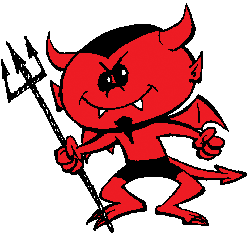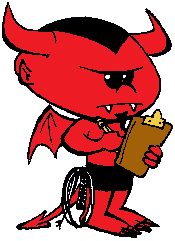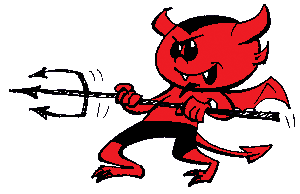



















|
Fast Play RulesBurn In Hell was originally created as a fast-play game. Some people liked it that way. More people didn't . . . so we abandoned that approach. Here's the last version of the fast-play rules. You will note that it refers to some special card types that don't exist in the published version. Fake it! Starting The GameYou need 4 or more players and a table. One player is chosen to be the Dealer and Referee for the first round. The Dealer does not play; he just deals the cards. We cannot prevent the Dealer from roleplaying Satan, Overlord of the Underworld, Prince of Lies and Ruler of All Damned Souls. But we don't insist on it. The dealer shuffles the deck and, when the players are ready, begins dealing cards to each player, in order around the table, FACE UP. The game begins as soon as the first card hits the table. The players should agree in advance how fast the dealer should go. One card every two seconds may be about right. The dealer may count out loud if he likes. Counting "Mephistopheles Beelzebub One, Mephistopheles Beelzebub Two . . ." works for us, but it gets old after a while. 
The dealer does not stop dealing until (a) all the cards are dealt; (b) a player hands him a STOP card; or (c) he detects some sort of rules impasse or confusion, in which case he stops dealing and acts as Referee. See below. Play Of The GamePlay goes on in real time while the dealer continues to deal. The flow of damned souls into Hell is continuous. Well, almost. That's what the STOP cards are for. As the souls flow into Hell, they are divided more or less evenly between the Demon Princes. The Princes, of course, are not satisfied with an even division. They constantly bicker among themselves, swapping souls for more amusing ones, or just stealing them! Most souls, of course, are worthless and ordinary, but some souls are special, and the Princes vie for these. When a player gets a card, he may arrange it in front of him in any way he wants, but he cannot conceal it in any way . . . until he completes a Circle of souls, which lets him hide and protect those cards. As the cards continue to fall, players may arrange their souls to see what they have; trade and steal souls from other players; argue, complain, and moan . . . TradingMost cards change hands by trading. Players may make any trade they want, for souls, specials, or combinations. Any player may suggest a trade at any time, except to a player who is currently dealing with a Special someone has handed him. When a trade is agreed on, each player picks up the cards he is giving away and hands them to the other player. The RefereeAny player can call on the Referee at any time for either a question or a challenge. Either one stops the dealing. To do this, say to the Referee either "Question!" or "Challenge!" A question is just a request to clarify a rule. It is not directed against any particular player. The Referee stops dealing and gives the best answer he can. However, if he thinks the questioner was trying to stall the game, he can skip dealing the questioner his next card. Play may continue while the Referee is thinking or answering. A challenge takes place if the player thinks another player is doing something wrong . . . usually this is because a Special is being misplayed. The Referee stops dealing and gives a judgment. He can punish either player (or both, or neither) by skipping their next card. Play must STOP while a challenge is going on; table talk and dickering may continue but no cards may change hands. The decisions of Lucif . . . errr, that is, of the Referee, are final. If you don't like them, wait till the next game, when he's not the dealer any more, and punish him. 
The CardsThere are two kinds of cards: Souls and Specials. They are shuffled together into the deck. SoulsSoul cards represent the souls of prominent mortals, now doomed to writhe forever in the lake of fire. Each Soul card contains the following information: Name. Just so you know who you're tormenting. Description. A card may have multiple descriptions. Sins. One or more of the Seven Deadly Sins, representing the reason why that particular soul has been invited to the Permanent Pitchfork Party. Value. The more delectable the soul, the higher its point value. Special Notes. Some souls have special uses. SpecialsSpecial cards, like Souls, are cast face-up in front of the players. Each Special can be used once and then discarded. Each Special has instructions on it. When you are familiar with the game you won't need to stop and read the Specials. This is a distinct advantage! A player can discard a Special without using it if he sees a reason to do so. Specials include: STOP. Makes the dealer stop dealing for a minute by the clock. STEAL A SOUL. There are several of these, specifying different sorts of souls to steal. To use one, you must slap it in front of a rival and point to the card you want. The victim must stop what he is doing and hand you the card (if he agrees the Special applies to it) or scream "Challenge!" to the referee (if he thinks it doesn't). The victim must then take the Steal card and put it in the discard pile. STEAL A SPECIAL. Used the same way, but to take any Special card your victim has in front of him. DIG UP THE BONES. Lets you go through the discards and take any one discarded card. But while you're doing this, other things may be happening . . . and your use of DIG may be interrupted if someone plays another Special on you. LAKE OF FIRE. Indicate one soul, as for Stealing, but that soul goes straight to the discard stack! If you have a card in your hand (rather than on the table in front of you) it cannot be stolen. However, the dealer will give you no new cards while you are actually clutching a soul in your talons. This applies both to your own cards (forming a Circle) and others' cards (using a Special to steal one). The dealer should do his best to distinguish "holding a card" from "moving cards around on the table." Careful players will have their hands well away from the cards when the deal comes their way. InterruptionsVarious events in the game can interrupt other events, as follows: A challenge or question interrupts EVERYTHING except an existing challenge or question. If a challenge or question is called while the Referee is working out a previous one, the Referee finishes with one and immediately takes up the next one. No cards are dealt between the two. Making a Circle takes precedence over all other types of play and cannot be interrupted by Specials (see below). Other players may continue play while you are making a Circle. Play of a Special card interrupts the victim.s arranging his cards, deal-making, and the like. If you are handed a Special, you must stop what you are doing and deal with it (or question/challenge it). If another Special is played in the meantime, you must finish dealing with the first and immediately take up the next one. You may not do anything else betwen the two. CirclesIf you collect the right kind of souls, you can combine them into a Circle . . . which scores extra and cannot be stolen by your fellow fiends. When you make a Circle, turn all its cards over and put them in a stack in front of you. Each Circle you complete must be its own stack. You may not add to a Circle, or break it up again, after you complete it. You may LOOK at your own Circles if you want to. 
A Circle must consist of one of the following: (a) Exactly seven souls, one for each Deadly Sin. Souls with more than one Sin can count for any Sin they committed, but only once per circle. (b) At least 20 points worth of souls of the SAME sin. (c) At least four Souls with the same point value. (d) A single Soul plus the "Solitary Confinement" Special. (e) A combination of Souls as indicated on the cards themselves. For instance, if you can get Hitler, Nero, and Caligula, they can form a Circle by themselves. This is shown on each of those three cards. Ending The GameThe game ends soon after all the cards are dealt. As soon as one further minute passes with no cards changing hands . . . or as soon as all Specials are used up . . . or as soon as all the players say "Finished!" . . . then it's time to count score. Players score points for all the souls they have at the end of the game. Souls outside of Circles have the value shown on the card. Souls in Circles count double. However, if a Circle was mistakenly completed -- that is, if it has insufficient souls, or the wrong kind - it does not score at all. And if that proves not to be bad enough, we'll come up with more penalties. Starting OverTwo options: (a) Whoever scored highest is the winner and becomes Dealer for the next round. If you are doing it this way, then just keep playing as long as it's fun. (b) The person to the old Dealer's right becomes the new Dealer. Play as many rounds as there are players, with each person dealing once. Total each player's score in all rounds to see who wins. |